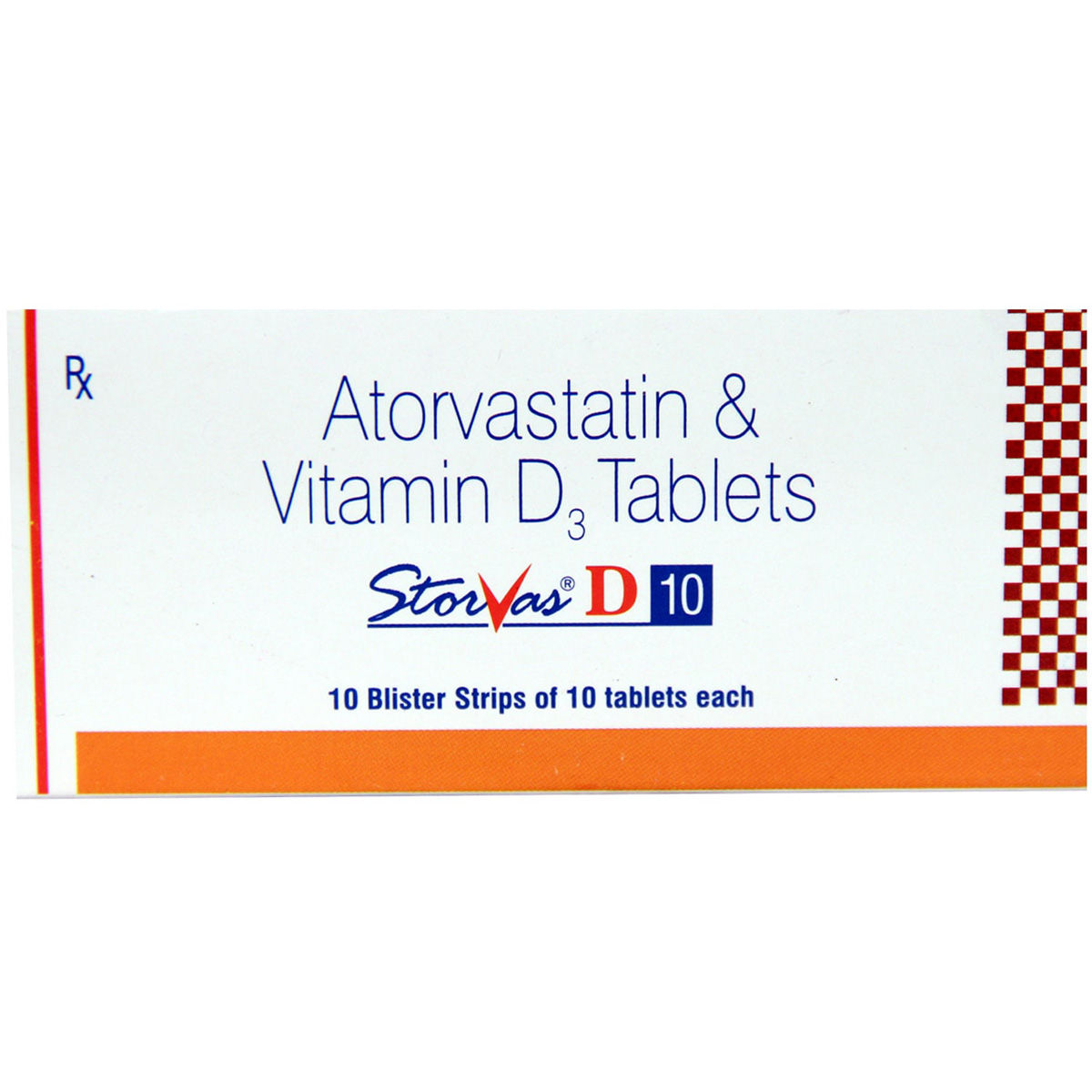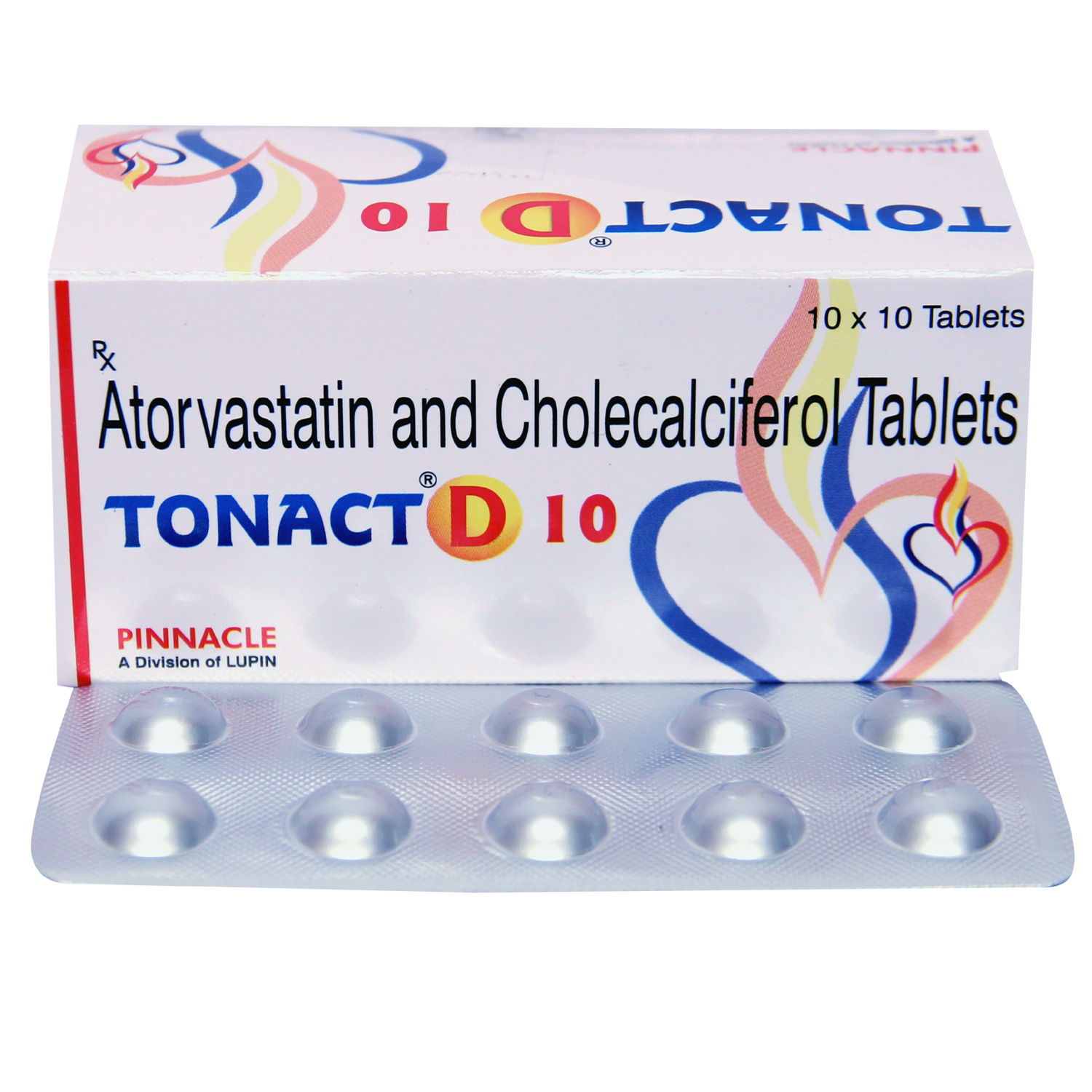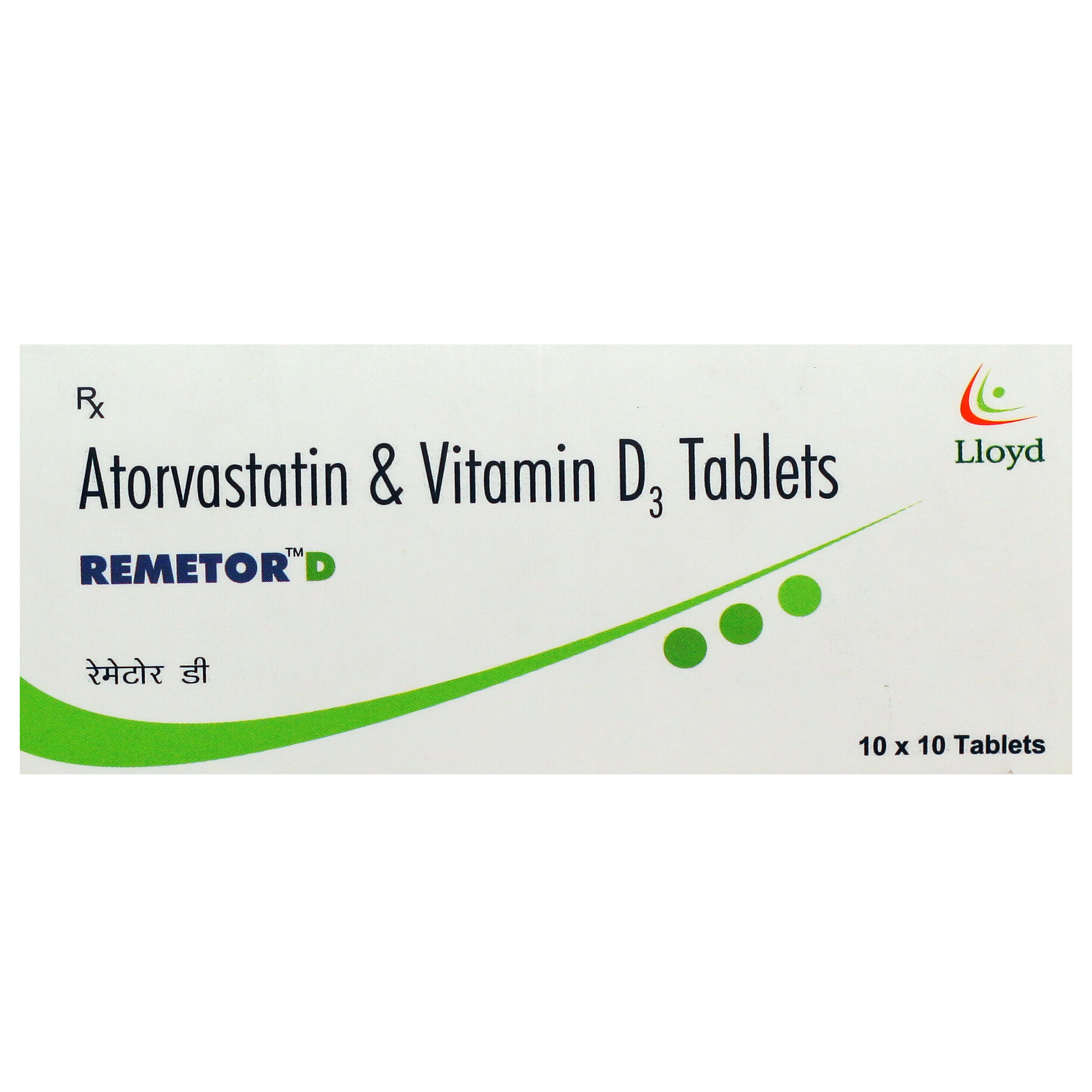Atorvastatin+cholecalciferol
About Atorvastatin+cholecalciferol
Atorvastatin+cholecalciferol is a cholesterol-lowering medicine containing atorvastatin (statins or lipid reducer) and cholecalciferol (Vitamin D3). It helps lower bad cholesterol (low-density lipoprotein-LDL) and triglycerides (fats) levels. Hence, it reduces the risk of heart attack and stroke in the future. Two types of cholesterol are found in our body: good cholesterol (high-density lipoprotein) and bad cholesterol (low-density lipoprotein). Good cholesterol is good for our heart and helps reduce the bad cholesterol in our body. On the other hand, excess bad cholesterol (LDL) leads to the risk of heart diseases like heart attack and stroke.
Atorvastatin+cholecalciferol works by blocking liver enzymes, causing the liver to make less cholesterol. So, Atorvastatin+cholecalciferol increases the uptake and breakdown by the liver of cholesterol already in the blood. Thus, Atorvastatin+cholecalciferol lowers the levels of lipids known as cholesterol and triglycerides in the blood when lifestyle changes (like a low-fat diet) on their own have failed. Atorvastatin+cholecalciferol reduces the ‘bad’ cholesterol and increases the ‘good’ cholesterol by blocking our body’s production of ‘bad’ cholesterol. It also improves your body’s ability to remove it from your blood. Cholecalciferol is added to relieve the muscle pain caused due to atorvastatin. Collectively, Atorvastatin+cholecalciferol helps reduce cholesterol levels in the blood.
The prescribed dose of Atorvastatin+cholecalciferol is daily once a day at the same time. Your doctor will advise you on how often you take your tablets based on your medical condition. You can take Atorvastatin+cholecalciferol with food or without food. It should be swallowed whole with a glass of water. Do not chew, bite, or break it. In a few cases, you may experience allergic reactions, headache, blurred vision, pain, constipation, nausea, diarrhoea, muscle spasms, joint swelling, and back pain. Most of these side effects of Atorvastatin+cholecalciferol do not require medical attention and gradually resolve over time.
Atorvastatin+cholecalciferol may cause a breakdown of skeletal muscle tissue, leading to kidney failure. This condition usually occurs in the elderly, people with kidney disease, and poorly controlled hypothyroidism (underactive thyroid). Atorvastatin+cholecalciferol should not be prescribed to children less than ten years of age. You should contact a doctor before if you have had an allergic reaction to Atorvastatin+cholecalciferol, have liver or kidney problems, pregnant or planning to get pregnant, are breastfeeding, have severe lung disease, have a previous heart attack or stroke caused by bleeding in the brain, have hypothyroidism, drink more than two servings of alcohol per day and have a muscle disorder (fibromyalgia). The efficiency of Atorvastatin+cholecalciferol can be increased by taking low-fat or cholesterol-containing food and drinks.
Uses of Atorvastatin+cholecalciferol
Medicinal Benefits
Atorvastatin+cholecalciferol contains Atorvastatin (fat or lipid reducer) and Cholecalciferol (Vitamin D3). Atorvastatin works by blocking liver enzymes, causing the liver to make less cholesterol. So, Atorvastatin+cholecalciferol increases the uptake and breakdown by the liver of cholesterol already in the blood. Thus, Atorvastatin+cholecalciferol lowers the levels of lipids known as cholesterol and triglycerides in the blood when lifestyle changes (like a low-fat diet) on their own have failed. Atorvastatin+cholecalciferol reduces the ‘bad’ cholesterol and increases the ‘good’ cholesterol by blocking our body’s production of ‘bad’ cholesterol. It also improves your body’s ability to remove it from your blood. Cholecalciferol or Vitamin D3 is added to get relief from the musculoskeletal pain caused due to atorvastatin. Collectively, Atorvastatin+cholecalciferol helps reduce the raised cholesterol level in the bloodstream.
Directions for Use
Storage
Side Effects of Atorvastatin+cholecalciferol
- Headache
- Blurred vision
- Muscle weakness
- Allergic reactions
- Constipation
- Nausea
- Diarrhoea
- Back pain
Drug Warnings
Atorvastatin+cholecalciferol may cause serious muscle problems (myopathy and rhabdomyolysis) and can lead to kidney failure. This condition usually occurs in the elderly, people with kidney disease, and poorly controlled hypothyroidism (underactive thyroid). Atorvastatin+cholecalciferol should not be prescribed to children less than ten years of age. You should contact a doctor before if you have had an allergic reaction to Atorvastatin+cholecalciferol, have a liver problem (jaundice, liver cirrhosis), or kidney problems, are pregnant or planning to get pregnancy, are breastfeeding, have severe lung disease, have a previous heart attack or stroke caused by bleeding in the brain, have hypothyroidism, drink more than two servings of alcohol per day and have a muscle disorder (fibromyalgia) and damaged muscle tissue (rhabdomyolysis). Also, calcium levels can decrease in blood, so intake calcium supplements to avoid unpleasant side effects.
Drug Interactions
Drug-Drug Interactions: Atorvastatin+cholecalciferol may have interaction with antibiotics (clarithromycin, cephalexin, tetracycline, gentamicin), antifungals (itraconazole, miconazole, fluconazole, and ketoconazole), HIV medicines (like abacavir, retrovir, and tenofovir), hepatitis C medicines (ribavirin, elbasvir), contraceptive pills, anti-arthritis pills (cyclosporin), heart rate-controlling pills (digoxin, amiodarone) and anti-hypertensive drugs (like verapamil, diltiazem), stomach acid related medications (cimetidine).
Food-Drug Interactions: Atorvastatin+cholecalciferol may interact with grapefruit. It increases the concentration of Atorvastatin+cholecalciferol in your body.
Drug-Disease Interactions: Patients with serious liver disease (jaundice), kidney disease, lung disease, and muscle weakness (rhabdomyolysis) should be closely monitored while having treatment with Atorvastatin+cholecalciferol.
Drug-Drug Interactions Checker List:
Safety Advice

Alcohol
unsafeDo not drink too much while taking this medicine. Drinking a lot of alcohol will make you more likely to get muscle problems (like myopathy and rhabdomyolysis) and liver problems (with side effects like yellowing of eye/skin and urine).

Pregnancy
unsafeAtorvastatin+cholecalciferol is pregnancy category X medicine. So it can cause damage to the fetus or unborn baby. Hence, Atorvastatin+cholecalciferol is not recommended during pregnancy. Contact your doctor before taking Atorvastatin+cholecalciferol.

Breast Feeding
cautionAtorvastatin+cholecalciferol can pass into your breast milk and may harm your baby. So, before using Atorvastatin+cholecalciferol, consult a doctor.

Driving
safe if prescribedAtorvastatin+cholecalciferol has no or negligible influence on the ability to drive and use machines.

Liver
cautionAtorvastatin+cholecalciferol to be taken with caution, especially if you have a history of Liver diseases/conditions. The dose may have to be adjusted by your doctor.

Kidney
cautionAtorvastatin+cholecalciferol to be taken with caution, especially if you have a history of Kidney diseases/conditions. The dose may have to be adjusted by your doctor.

Children
unsafeAtorvastatin+cholecalciferol is not indicated in the treatment of patients below the age of 10 years.
Habit Forming
Diet & Lifestyle Advise
- Try aromatherapy, yoga, and meditation to help relax your body and mind.
- Try to do breathing exercises to get more oxygen.
- Eat a healthy diet rich in soluble fibre like beans, legumes, whole grain, flax, apples, and citrus fruits.
- Try to replace most of your saturated fats with unsaturated fats that can reduce total cholesterol and LDL cholesterol quickly. Foods like avocados, olive oil, fatty fish, and nuts contain many heart-healthy unsaturated fats, so eating them regularly is beneficial.
- Try to adopt a Mediterranean-style diet rich in olive oil, fruits, vegetables, nuts, whole grains, and fish, low in red meat and most dairy.
- Try to give priority to more fruits and veggies in your daily meal as these contain antioxidants which help to lower LDL
- Minimize the intake of added sugar. The American Heart Association (ADA) recommends that one should not eat more than 100 calories (25 grams) of added sugar for women and children and no more than 150 calories (37.5 grams) for men every day.
- American Heart Association recommends that sodium chloride (table salt) intake should not exceed more than 2,300 mg per day as part of a healthy eating pattern.
- As a precautionary measure, do not consume alcohol and quit smoking.
Patients Concern
Disease/Condition Glossary
Hyperlipidemia: High cholesterol, known as hyperlipidemia or dyslipidemia, occurs when there is an excess of the unhealthy cholesterol balance in the blood. When there is a high cholesterol level in the blood, your arteries get narrowed and clogged, which finally contributes to heart diseases like stroke and heart attack. Eating high-fat or high-cholesterol-containing food/drinks and genetic factors are the primary causes of high cholesterol.
FAQs
Atorvastatin+cholecalciferol is used to treat high cholesterol. It lowers bad cholesterol (low-density lipoprotein-LDL) and triglycerides (fats) levels. Hence, it reduces the risk of heart attack and stroke in the future.
There's no strong evidence to suggest that taking Atorvastatin+cholecalciferol will reduce fertility in either men or women. However, it is advisable to consult a doctor before taking it if you're likely to get pregnant or pregnant.
Increase your daily diet with fiber, fruits, vegetables, whole grains, and fish, and cut saturated fat as well. Stop smoking and drinking and try to work out every day as well.
No, you should not stop taking Atorvastatin+cholecalciferol without consulting your doctor. Please take advice from the doctor before quitting.
People affected with hypothyroidism (underactive thyroid), muscle weakness, joint pain, kidney disease, diabetes, liver disease, uncontrolled epilepsy, high or low potassium level, or severely low blood pressure.
There is no firm clinical evidence stating that an intake of Atorvastatin+cholecalciferol causes harm to the baby. However, Atorvastatin+cholecalciferol passes into the breast milk and may harm the baby. It is advisable to consult a doctor if you are a nursing mother and taking Atorvastatin+cholecalciferol.
Yogurt is a probiotic which can help in lowering the raised cholesterol level if taken with Atorvastatin+cholecalciferol. Yogurt eaters have a better metabolic profile than those who didn't eat yogurt.
Egg yolks (yellow part of the egg) are high in cholesterol and rich in saturated fatty acids with a greater effect on our blood cholesterol levels. However, you can take a minimum of 3 whole eggs per day as eggs are considered a good source of HDL (good cholesterol). If you have high cholesterol, please consult a doctor regarding intake of the yolk part of the egg.








